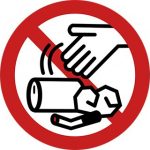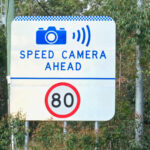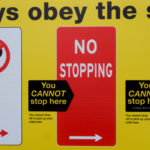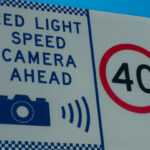The Offence of Littering in New South Wales
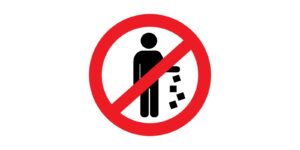
A teenager on the NSW Central Coast has received a fine after becoming famous as a “speed camera crusader”.
17-year old Beau Jackson was recently the subject of a story on one of Australia’s most watched current affairs programme for his dedication to his hobby – warning drivers about a mobile speed camera in his neighbourhood which he sees as an unfair, revenue raising ‘speed trap’.
Good Samaritan
Beau has helped thousands of cars to slow down and avoid speeding fines by parking his motorcycle and holding up a warning sign, with a view to alerting drivers about 100m up the road from where the camera which is situated at the bottom of a steep hill.
Bizarrely, after his story was aired on TV, Beau received a $250 fine in the mail from the New South Wales Environmental Protection Agency (EPA).
When he called to make enquiries, Beau was told that his sign and some cans were found on the side of the road near where he warns drivers. He asked for evidence and was told there was no photographic proof of the alleged offence.
Beau says he always takes everything home with him, and is careful about never leaving rubbish behind.
He believes the fine is retribution for costing the state revenue, given that speeding fines in New South Wales add many millions to government coffers every year.
Speeding in New South Wales
In 2020, the NSW Government decided to remove all warning signs for mobile speed cameras across the state, but has since backtracked after criticism of creating a ‘cash cow’ and concern over the fact that fines increased dramatically during the period without warnings, raising $40 million in revenue for the State Government.
While there is no doubt that speeding on the roads can cost lives, the State Government responded to the backlash, and decided that it needed to find a balance between ensuring that motorists keep to the limit, but also provide fair warning in areas where speeds are monitored.
Mobile speed camera warning signs and now back on the roads, and about a thousand fixed warning signs have also been installed, alerting drivers to the locations where speed cameras are located.
The Environmental Protection Agency
The Environmental Protection Agency is the primary environmental regulator for New South Wales.
Its mandate includes reducing pollution and waste, protecting human health, and preventing environmental degradation.
Some of the laws aimed at facilitating these objectives are contained in the Protection of the Environment Operations Act 1997.
The offence of littering in New South Wales
Littering is an offence under section 145 of the Act which provides as follows:
- “A person who deposits litter in or on a public place or an open private place is guilty of an offence: Maximum penalty–20 penalty units.”
A penalty unit for New South Wales offences is currently $110, which means the maximum fine in the case of the matter going to court is $2,200.
However, the EPA can issue a fine rather than take the matter to court.
The fine for littering is currently $250.
Exceptions
Subsection 145(3) of the Act makes clear that a person is not guilty if the litter was:
- placed in a receptacle provided by the custodian of the place for the depositing of litter, and
- in accordance with any conditions specified by the custodian, by means of a notice displayed on or in the vicinity of the receptacle, in relation to the depositing of litter in the receptacle, or
- placed a receptacle containing the litter in the place for the purpose of the litter being removed in the course of a litter removal service provided by the custodian of the place, or
- deposited the litter in the place:
- in response to an invitation contained in a notice published by the custodian of the place, and
- in accordance with any conditions specified in the notice in relation to the depositing of litter in that place, or
- deposited the litter in the place with the express consent of the custodian of the place.
- deposited the litter in the place under an authority conferred by or under this or any other Act or any Commonwealth Act, or
- deposited the litter in accordance with any regulations made for the purposes of this section or in such circumstances as may be prescribed by any regulations made for the purposes of this section.
Litter includes all manner of rubbish, personal and household and commercial, including such things as glass, metal, paper, fabric, wood, food, abandoned vehicles, abandoned vehicle parts, abandoned furniture or other household goods, construction or demolition material, garden remnants and clippings, soil, sand, rocks.
A ‘public place’ is defined as a place that is open to the public, or is used by the public, whether or not on payment of money or other consideration, whether or not the place is ordinarily so open or used, and whether or not the public to whom the place is so open, or by whom the place is so used, consists only of a limited class of persons.
Aggravated littering is an offence under section 145A of the Act which carries a maximum penalty of $3,300 for individuals and $5,500 for corporations.
The circumstances which aggravate the offence of littering is where the conduct:
- caused or contributed to appreciable danger or harm to any persons, animals, premises or property, or
- was reasonably likely to cause or contribute to such danger or harm (whether or not any such danger or harm was actually caused), because of the volume or kind of litter deposited, or the manner in which it was deposited, or the place in or on which it was deposited.
The subsection makes clear that it encompasses a lit cigarette..
Back to Beau
Beau now has the option to appeal the fine. This is done through Revenue NSW, which collects all fines handed out by State Government agencies in New South Wales. Contesting the fine will result in an internal review.
If after the review, Beau is not happy with the outcome, he can appeal the fine in court, however courts do have the power to impose tougher penalties if they determine the fine should be upheld.
It’s important not to ignore a fine from Revenue NSW, as it has the power to charge late fees and other penalties if you don’t pay by the deadline.
It can also garnish wages in an effort to recover money it is believed it is owed, and even lead to your driver licence being suspended for non-payment.


